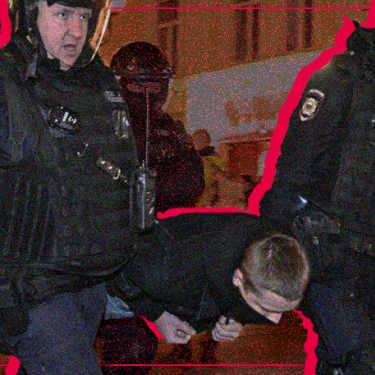At least eight Russian journalists arrested while covering anti-mobilisation protests

At least eight journalists were arrested on 21 September during protests in 42 Russian cities against Vladimir Putin’s “partial mobilisation.” Reporters Without Borders (RSF) condemns this crackdown designed to suppress domestic news coverage that is essential for the Russian public.
Read in Russian/ Читать на русском
“By forcibly obstructing the work of Russian journalists, the Kremlin seeks to impose its version of events both within Russia and abroad,” said Jeanne Cavelier, the head of RSF’s Eastern Europe and Central Asia desk. “The increasingly systematic arrests of journalists and the growing impunity of the police are symptomatic of the information war being waged by Vladimir Putin. We reaffirm our support for independent Russian journalists who, by still daring to do their job, are courageously resisting the government’s desire to silence them.”
Reporter Artem Krieger was providing live coverage of a protest against Putin’s “partial mobilisation” for SOTAVision’s YouTube channel in Moscow on 21 September when he was arrested without any explanation by police who, paying no attention to his press vest and press card, took him away in a police truck and ended up holding him for 24 hours.
Krieger was then given an order to report to a military centre, as were all the men who were arrested during the protest. He was also charged with “blocking the movement of transport, pedestrians and infrastructure operations during public actions.” His trial was finally scheduled to take place (23 September) after being postponed twice.
At least seven other journalists were also arrested while covering protests throughout the country on the evening of 21 September. Most of them were displaying visible signs of working for a media outlet at the time of their arrest, but that did not deter the police.
The police went so far as to snatch SOTA news website reporter Ekaterina Parfenova’s press card and press vest when arresting her in the northern city of Arkhangelsk. In Kazan, the capital of Tatarstan, police told reporter Nailya Mullaeva that the SOTAVision stamp on her press card was not sufficiently legible before charging her with “participating in an illegal action.”
Natalia Baranova, a journalist working for the local news outlet Tomiks was arrested whilst covering a protest in Vladimir, 200 km east of Moscow, and released on the evening of 21 September after being questioned at a police station. But others were given fines and some were charged. They included RusNews reporter Andrei Kichev in Arkhangelsk, who was charged with “discrediting the army,” and SOTAVision’s Boris Zhirnov in the far-east city of Khabarovsk, who was charged with “violating the established procedure for holding a public event.”
The laws regulating the news media have become much tougher in the past six months. Under a major amendment on 4 March to the 2019 law on disinformation, journalists can be sentenced to up to 15 years in prisons for publishing information about the Russian armed forces that the authorities deem to be “false” or to have “discredited” them. In addition to this amendment, which has been amended several times since March, at least six other equally Orwellian laws have been hastily adopted since Russia launched its invasion of Ukraine.
